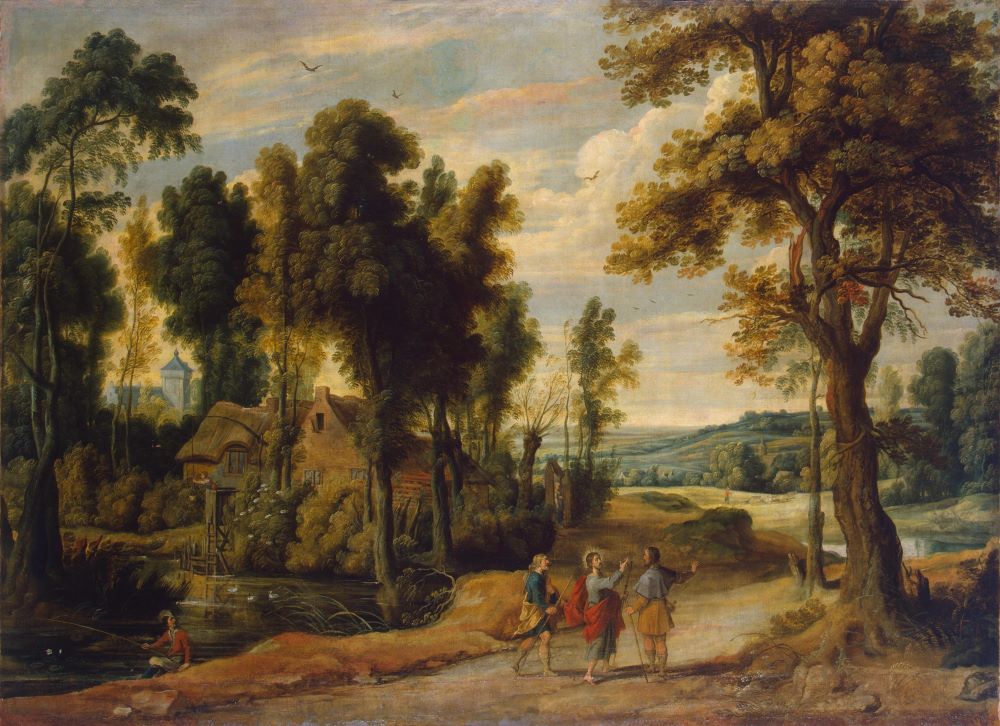
"Christ on the Road to Emmaus," by Jan Wildens, 1640s (Wikimedia Commons/The Hermitage State Museum)
Eastertide is a joyful time that gives us a spirit of freshness; it can mark a new beginning with many opportunities to rise again, especially from where the future looked dark. We all desire to move on in spite of yesterday's struggles.
I believe there can be no Easter without Good Friday: Sometimes a difficult moment precedes joy and peace. I can be overwhelmed if I don't realize that challenges come with loads of meanings and richness, and merely oppose them. Was this what happened to the two disciples on the road to Emmaus? Do we not do the same? Even when the blessings are in our hands — having borne the struggles bravely — we keep hoping that greater things are just about to happen unrelated to the experiences that we have had. Sometimes, like these disciples, we have even been warned of what to expect before our deepest longings can be fulfilled.
Following the death of Jesus, the disciples were deeply saddened, as any of us would be after losing our hero. Their hope of a bright future had been dashed. They feel this way despite having read about Jesus in the Hebrew Scriptures, as he reminds them on the road in Luke's Gospel) account: "Was it not necessary that the Christ should suffer before entering into his glory?" (Luke 24:26).
In the past few years, I have challenged myself to trust the word of God. If a friend tells me that he or she is coming to visit, I do not doubt it, and many times I do not even need to confirm whether they will come. So why is it hard to believe the word of God, the creator of all life? When I have invited myself to give the word of God a chance, I experienced great confidence in God. This leap of faith is rewarding, and I notice that my conversations change.
Advertisement
The disciples had gone to Jerusalem for the Passover feast, a very sacred moment that signified their relationship with their God; Jerusalem represented a place of peace for them. However, the course of events changed this time: Jesus, their great teacher, healer, friend and future king, had been crucified. It appeared to them that following Christ had been futile. They could only go back home and start all over again. They joined the rest of the town folk in discussing the breaking news, overwhelmed by grief and disappointment. Apparently, the message of the Scriptures did not speak to them.
Suddenly, Jesus joined them, listened to what they were talking about, and later took part in their conversation. They did not recognize him. Many times, we are no different from these disciples. When things go contrary to our expectations, it is like a light bulb has gone off. Yet, this darkness is the entry point for greater things to happen, a moment for peace to be restored. That is what the crucifixion, death and resurrection of our Lord involved: a dark moment followed by a great joy.
Jesus seemed to understand their problem; though they had read the Scriptures many times, they had not understood and therefore did not believe. No wonder that even after all Jesus had taught and done, it never dawned on them that he was the long-awaited messiah. He said to them; "You foolish men, so slow to believe all that the prophets have said" (Luke 24:25). And then he explained to them the passages in the Hebrew Scriptures that were about himself.
This marked the beginning of change in the content of the conversation. After this and the breaking of the bread, they recognized him. Their hearts had been burning, and their feet were re-energized, so much so that they could not spend the night in Emmaus. Immediately they begin their return journey to Jerusalem, testifying about the risen Lord.
The conversation on the road to Emmaus was all despair, loss and disappointment. On the other hand, the road to Jerusalem was one of joy, proclamation and testimony of their experience, of the Scriptures that had finally sunk into their hearts and minds. They understood the passages of the Scriptures. Jesus has conquered death. We too are happy and identify with his triumph.
At this point in time — despite how things are going for any of us — we are on the road to Jerusalem, sharing with our brothers and sisters the resurrection of our Lord Jesus Christ. The readings these days are also talking about the same message. Sometimes I wonder at how we treat Easter as an event that we take part in, then we return to our ordinary conversations, lamenting over nearly everything!
I think that the secret of sustaining our conversation on the road to Jerusalem is to begin reading the Scripture passages in a renewed way. Having read, then let us believe in what they are telling us. Jesus explained the Scriptures to the disciples on the road to Emmaus, and he explains them to us, too, as we read them.
Let us ask him to help us understand, so that when things happen in our lives, we can look at them through the eyes of Christ — and rather than complain, to be inspired to wait for greater things to happen. The disciples were not strangers to the Scriptures. But they lacked faith in what they read, so there was actually no difference between them and those who had not read.
When we deepen our faith in God, we will be able to do great things and in turn glorify God. We see this in what the apostles were able to do after the resurrection. Through them, the number of believers increased; they worked signs and wonders, and we read "the sick came with hope that at least the shadow of Peter might fall across some of them" (Acts 5:15). Just as we are transformed by the resurrection of Christ, so can we transform the lives of others.
The secret of peace is faith in God. Jesus' gift to his disciples after resurrection was peace. We can only access this peace if we believe. Then after bearing our challenges patiently, we can sing like the Israelites on return from exile: "Yahweh did great things for us, and we were overjoyed" (Psalm 126:3). With belief comes the gift of the Holy Spirit, and with this Jesus gives us the power to forgive. The ease with which we forgive shows that we are indeed people of resurrection.





